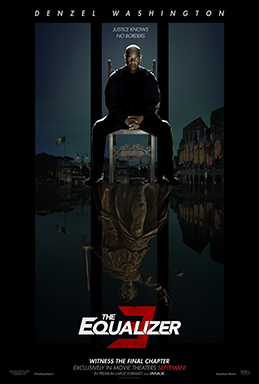‘The Equalizer 3’: Denzel Delivers Justice, Italian Style… with Lots of Red Sauce

Of the great action-hero franchises that draw real profits from your neighborhood theater, the best never cheat on their promise. Keanu Reeves survives as John Wick because the fight scenes are relentless, seemingly filling an entire two hours or more. Vin Diesel comes out alive in every Fast and Furious feature because his racing stunts—as well as the adrenaline that drives them—never fail. Likewise, Denzel Washington’s The Equalizer lives to fight another day because his one-man brand of vigilantism is, above all, ruthless, brutal, and beyond gory. That’s the promise of writer Richard Wenk and Director Antoine Fuqua who have teamed up with Washington in all three successful outings. And, boy, do they deliver.
Set mostly in the (perhaps fictional) village of Altamonte, Italy (think the Amalfi Coast, because the real Altomonte is in the hills of Calabria), Robert McCall (Denzel Washington), former black-ops DIA (Defense Intelligence Agency) agent, finds himself ready to retire. He has barely survived the opening scenes, set in Sicily, where he has single-handedly killed all but three henchmen of an abhorrent drug lord discovered and known only to McCall. Of course, McCall manages to escape, but barely. Which is why he wakes up, mindless and nearly bloodless, in the Altamonte bed of a local doctor who humbly heals his wounds. On the mend, McCall explores the small coastal village. The local waitress is a beauty. The carabiniere are kind. The widows bring him treats. Even the local fishmonger insists on not being paid by the welcome stranger. McCall is charmed. Except, something sinister is going on behind the billowing curtains of these kindly townsfolk. Extortion. The local mob boss, desperate to recover recent losses incurred in Sicily (Aha!), employs his son to up the stakes.
Denzel is always mesmerizing. His screen presence is a study of calm composure; relaxed, “chill,” but keenly aware, his kind of steely confidence is incomparable to a Liam Neeson, a Bruce Willis or even a Tom Cruise. And it’s precisely this steadfast coolness that amazes audiences when he abruptly turns on his antagonists, driving a ballpoint pen through a bloody wrist or a stiletto into the eye. Yes, the fascination of The Equalizer franchise is in the bloodlust, the cringing torture, the absolute extraction of a kind of Hammurabi’s Code (an eye for an eye; a tooth for a tooth) that is not nearly as literal as it is lethal. The Equalizer 3 is not for everyone. It might not be the kind of role all Denzel fans want to see. But it is Story (with a capital S) and Action and Intrigue and, above all, Justice meted out with spectacular shock and awe.
Which is also to be credited to the extraordinary team of Wenk and Fuqua. Richard Wenk is the master of revenge films, credited recently with writing The Protégé (2021), American Renegades (2017), and screen work on The Magnificent 7 (2016) and The Expendables 2 (2012). Antoine Fuqua, of course, is Pittsburgh’s own. A longtime creative associate with Denzel Washington, they first worked together on Training Day in 2001. In addition to directing all three Equalizers, The Magnificent 7 (featuring Denzel Washington), Emancipation (starring Will Smith), and Olympus Has Fallen, Fuqua is also a wildly successful producer, having created dozens of music videos from whence he got his start.
And, while the premise of this third installment of The Equalizer franchise is that this is Robert McCall’s last—he is, after all, looking to retire in Altamonte—would it be shocking if a fourth film would or could not turn the massive profits this franchise has so justifiably earned? Or should that be, earnestly justified?
C. Prentiss Orr is a Pittsburgh-based writer who writes about theater and other topics for Entertainment Central. His latest book, The Surveyor and the Silversmith, is a history of white settlement, genocide, and land speculation in Western Pennsylvania.
Share on Social Media
Follow Entertainment Central
Latest Stories
Sign up for the EC Newsletter







